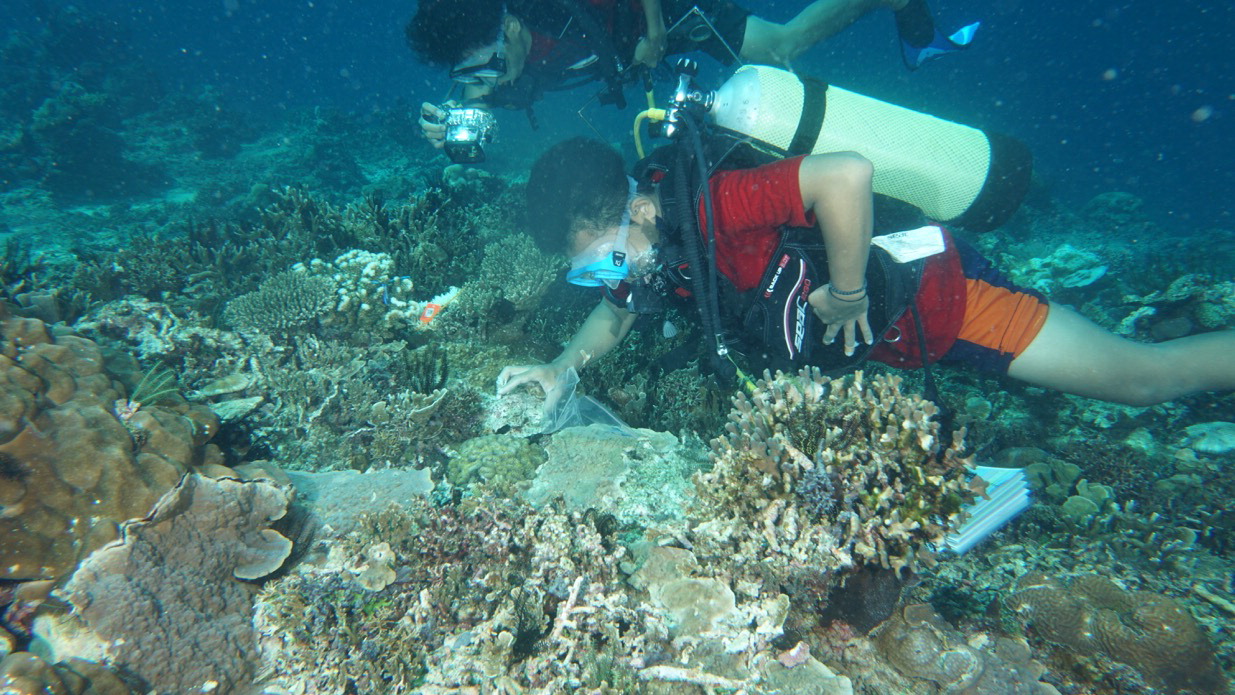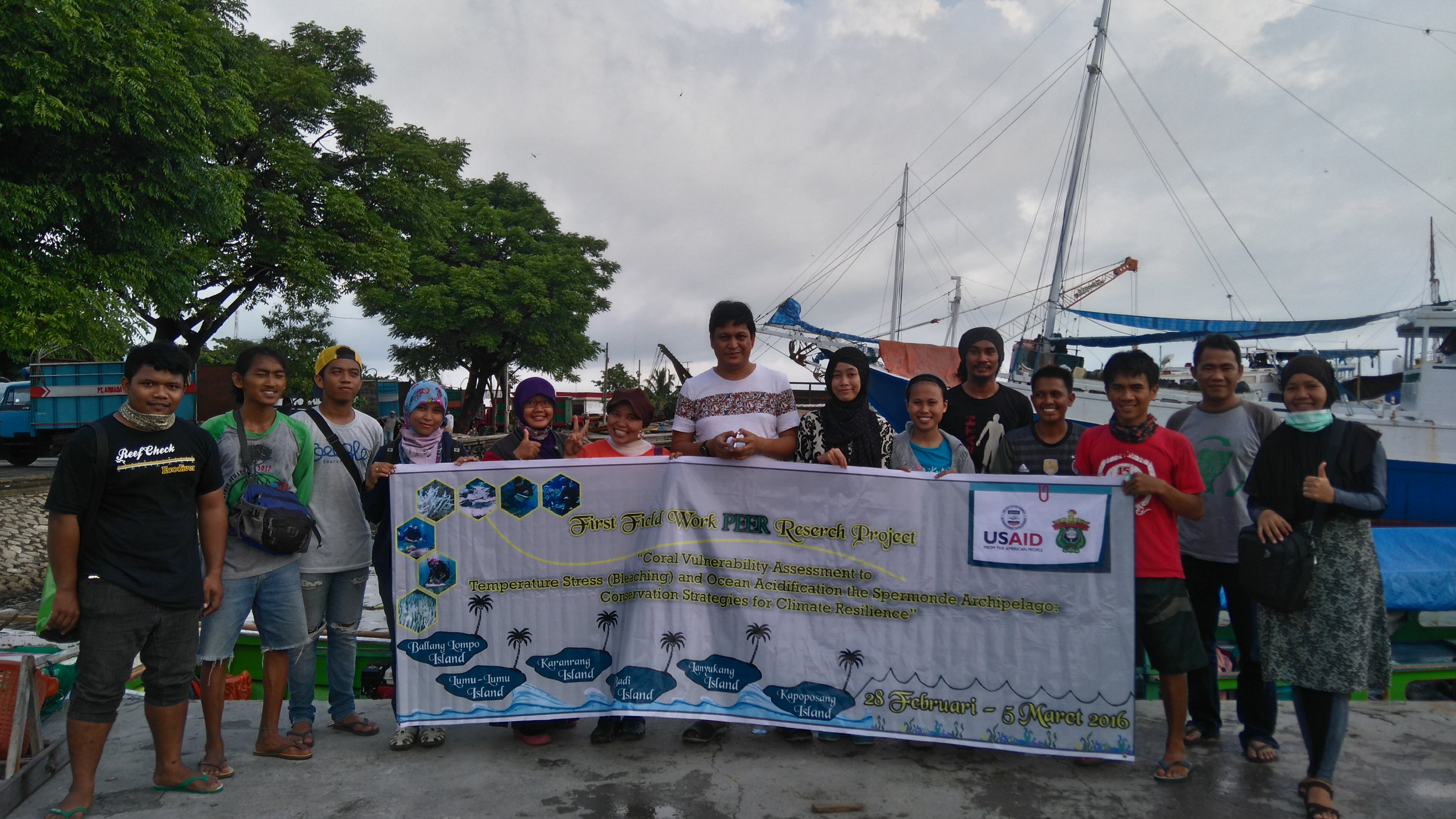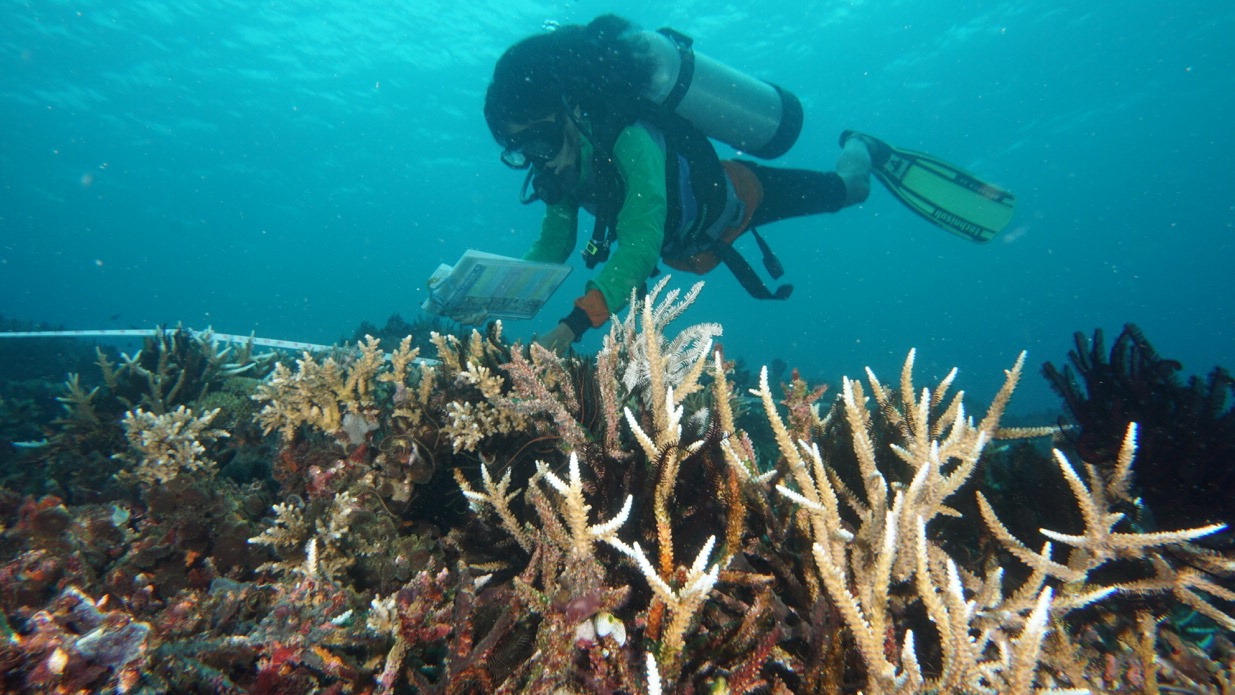|
Cycle 4 (2015 Deadline)
Coral vulnerability assessment to temperature stress (bleaching) and ocean acidification in the Spermonde Archipelago: conservation strategies for climate resilience
PI: Nita Rukminasari (nita.r@unhas.ac.id), Hasanuddin University, Indonesia
U.S. Partner: Brian Hopkinson, University of Georgia
Project Dates: December 2015 - November 2018
Project Overview
The focus of this project is categorization of coral species based on their ability to withstand stress events. The research to be carried out will provide science-based metrics and approaches that will be key in planning and managing future marine protected areas designed to protect reef biodiversity, reef productivity, and the socioeconomic welfare of communities depending on them. In the Spermonde Archipelago, a group of small islands off the west coast of South Sulawesi, coral reefs are invaluable resources both as a food source and as island protection. Ocean temperatures in the region have been increasing over the last decade, causing increased coral bleaching and losses of entire coral colonies in the Spermonde Archipelago, a trend that is predicted to continue with climate change. Increasing carbon dioxide concentrations in seawater cause ocean acidification that further stresses corals and the ecosystem. The Spermonde Archipelago is part of Coral Triangle region, which is the center of global coral reef diversity and known as the “Amazon of the seas.” However, the region is dramatically understudied given the attention it merits, and coral bleaching and the impact of increasing carbon dioxide on coral are poorly documented.
This research team will conduct field research at six islands in the Spermonde Archipelago to identify thermal- and acidity-tolerant coral species, map their distribution, and characterize habitats that through prevalent environmental conditions buffer coral species from the impact of thermal anomalies (including depth, temperature regimes, light attenuation, geomorphology, and prevailing currents). They will also conduct laboratory experiments to exam coral symbiotic zooxanthellae clades and determine their resistance to heat and acid stress. Existing management strategies will be reevaluated in light of this detailed physiological information and spatial mapping so that tolerance and environmental refuges may be incorporated into new Marine Protected Area (MPA) management strategies within the Spermonde Archipelago.
The project should lead to better management of coral reef ecosystems facing climate change by providing comprehensive information about the ecology and physiological characteristics of corals in the Spermonde Archipelago. It will also contribute to the management of Coral Triangle Marine Protected Areas, with a focus on managing for climate change resilience. The development of sustainable alternative livelihoods, namely marine fish aquaculture, is a key to reducing destructive fishing practices. Through educational and outreach in local communities, Dr. Rukminasari and her colleagues on the project aim to produce a long-term impact on sustainable human use of coral reef resources in the region. To this end, they will develop an easy-to-use monitoring protocol for assessing coral reef conditions and water quality changes that can be used by non-scientists to monitor the condition of their coral reef.
 |  |  | | | | Photos courtesy of Prof. Nita Rukminasari. |
Final Summary of Project Activities
During the last year of the project, which ended as of November 30, 2018, the PI Dr. Rukminasari and her team completed their ocean acidification experiment. The CO2 system that they built was running well and the experiment proceeded according to plan. From April through August 2018, they analyzed their data, and from September through November they worked on preparing two manuscripts, which will be published in March 2019. Over the course of the three-year project, the PI also updated curriculum materials used in several courses at Universitas Hasanuddin (Unhas), including Marine Tropical Ecology, Rehabilitation, and Conservation; Ecosystem System Information for Aquatic Resources Management; and Planktonology. The content of these courses has been enriched with information related to project results, particularly regarding climate change and coral resilience. Beyond the capacity building benefits for the researchers and students at Unhas, residents of six islands in the Spermonde Archipelago where the PEER team gathered data also gained new knowledge. As a side element to the project, the team took time during their field visits to conduct community service training workshops for the islanders on a variety of topics to build awareness about the importance of maintaining coral reef ecosystem health. The researchers also provided training for the communities on how they might increase their income through the introduction of alternative livelihoods besides their usual practice of fishing (for example, raising higher-value fish lobsters in floating cages).
At the time the final project report was submitted in early February 2019, Dr. Rukminasari and her team were still analyzing the results from their ocean acidification experiment, which involved collecting field data on coral bleaching at six study sites in addition to their ocean acidification experiment. Although final analysis is not yet complete, the PI reports that she and her group have gained a better understanding about coral bleaching and impacts of ocean acidification on coral around the Spermonde Islands. On this basis, they could develop better strategies for management and conservation of the coral ecosystem in facing climate change impacts, particularly increasing sea surface temperatures and ocean acidification. They expect that the development impact of this project would be increased in mid-2019, when they plan to submit a technical report to the Marine and Fisheries Agency at South Sulawesi Province regarding coral species from the Spermonde Archipelago that showed resistance to bleaching and ocean acidification. They subsequently plan to develop a tool to monitor and manage coral bleaching events, as well as a strategy for conservation of coral reef areas facing climate change.
On the outreach side, the PI and her colleagues have met with officials from the Marine and Fisheries Ministry of Indonesia to discuss implementation of their research results, especially with regard to monitoring and management of coral bleaching in the Coral Triangle. They continue to build a network focused on coral bleaching monitoring and data sharing, and they have initiated a collaboration with the Center of Excellence for Development and Utilization of Seaweed to conduct research using the PEER team’s CO2 experimental system. Another new research collaboration has been established with a researcher from Tadulako University, Palu, Central Sulawesi (Dr. Samlioke Ndobe) for conducting research on the impact of ocean acidification on sea urchins and Banggai cardinalfish. Although the PEER award has ended, Dr. Rukminasari also hopes to continue the excellent working relationship built with her U.S. partner Dr. Brian Hopkinson. She has already obtained funding from the Ministry of Research, Technology and Higher Education, Republic of Indonesia, to put the CO2 experimental system built with PEER support to continued use. That new project is entitled “The effect of increasing CO2 concentration on absorption rate, biomass, and bioremediation of super-intensive shrimp pond water waste by microalgae and cyanobacteria.”
Back to PEER Cycle 4 Grant Recipients
| 





